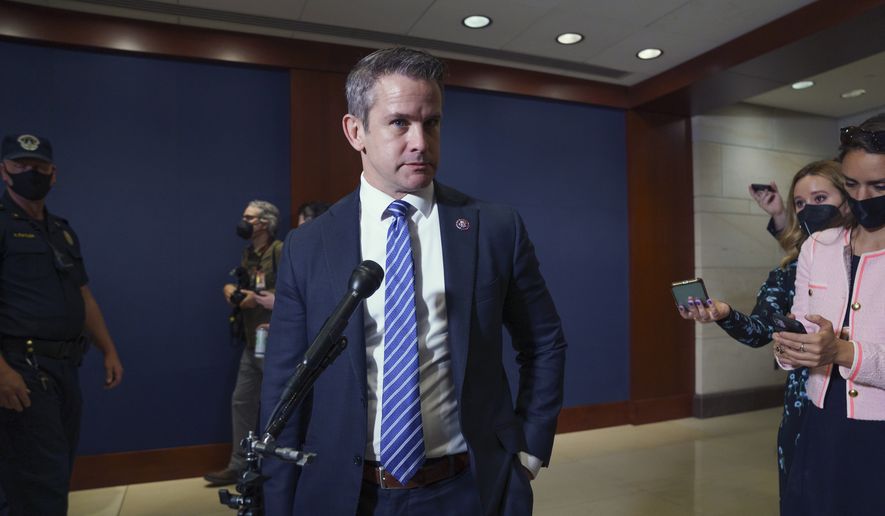The U.S. Chamber of Commerce is pressuring House Republicans to save President Biden’s $1.2 trillion infrastructure package in the face of rising opposition from far-left Democrats.
A whip list the Chamber is using to build support for the package, obtained exclusively by The Washington Times, indicates it’s targeting 57 potential GOP members who might support a centerpiece of Mr. Biden’s domestic agenda. The Chamber hopes to flip enough Republicans to overcome heavy opposition from the 98-member Congressional Progressive Caucus, who say liberal priorities are being lost as Mr. Biden tries to sell his spending programs on the Hill.
The list of Republicans being courted is both ideologically and geographically diverse. The Chamber is pursuing centrists like Brian Fitzpatrick of Pennsylvania and staunch conservatives such as Kelly Armstrong of North Dakota, alike. The business lobby has long backed more government spending on the roads, bridges and other physical infrastructure featured in the $1.2 trillion package.
In courting support for the bill, the Chamber is using a three-tier approach. Republican lawmakers who have already committed to voting for the bill make up the first tier. Eleven GOP lawmakers have so far pledged their support to the Chamber.
Five of those, including Reps. Adam Kinzinger of Illinois and Jamie Herrera Butler of Washington, voted earlier this year to impeach former President Trump for his role in the Jan. 6 riot at the Capitol.
Others, such as GOP Reps. David McKinley of West Virginia and Don Bacon of Nebraska, have taken stances directly opposed by Mr. Trump even if they did not support impeachment. Mr. McKinley and Mr. Bacon, for instance, backed Democratic efforts earlier this year to investigate the Jan 6. incident.
DOCUMENT: Chamber of Commerce whip sheet
Apart from those who have outright committed to backing the infrastructure bill, the Chamber has identified 46 additional House Republicans that are “worth trying to flip.”
Of that figure, 24 lawmakers are categorized as being in “tier two.” These lawmakers have privately told the Chamber and its lobbyists they view the [infrastructure] bill favorably but have not come out in support.” Members include GOP Reps. Mike Gallagher of Wisconsin, Peter Meijer of Michigan and Anthony Gonzalez of Ohio, among others.
The 22 Republicans in the third tier, according to the Chamber, are seen as “further away from a yes [vote] but still worth trying to flip.”
The U.S. Chamber did not immediately return requests for comment on this story. The business group has been one of the biggest backers of the infrastructure bill to date, investing both time and money in its passage.
“The infrastructure bill has earned the support of business and labor and deserves the support of every member of Congress,” Suzanne Clark, the CEO of the Chamber, said last month.
Despite the support, the legislation faces an uncertain fate when it comes up for a vote next week in the House.
The Democratic left wing, including nearly half of the Congressional Progressive Caucus members, are pledging to oppose the bill until the Senate passes Mr. Biden’s companion $3.5 trillion social welfare legislation.
“Yes, we need investments in roads and bridges — but we also need to make transformational investments in working families and our communities to improve people’s lives,” said Rep. Pramila Jayapal, a Washington state Democrat who chairs the CPC.
Democrats are pitching the $3.5 trillion bill as “human infrastructure” in hopes of making it easier to sell to voters. They claim it complements the $1.2 traditional infrastructure package, focusing on roads and bridges, that Mr. Biden negotiated with the Senate earlier this
But critics say the bigger bill amounts to a wish list of liberal priorities such as proposals for climate change, amnesty for immigrants who are in the U.S. illegally, tuition-free community college and expanded health care programs.
Given Republicans’ solid opposition in the Senate, Democrats plan to pass the $3.5 trillion package via a special process known as budget reconciliation. It allows some spending and tax measures to avoid the Senate‘s 60-vote filibuster threshold and pass with a simple majority of 51 votes.
Since the Senate is evenly split between both parties, any single lawmaker can exert significant influence over its crafting. Moderate Democrats, including Joe Manchin III of West Virginia and Kyrsten Sinema of Arizona, appear to be doing exactly that at the moment.
The two lawmakers have repeatedly called for trimming the price tag from $3.5 trillion by nearly two-thirds. Mr. Manchin, the chairman of the Senate Energy Committee, has also promised to block stringent climate change regulations that seek to phase out coal and natural gas from electricity production.
Progressives argue that a smaller, watered-down package is worthless and a waste of the current Democratic control of the White House, Senate and House. To pressure Mr. Manchin and Ms. Sinema, they have linked the reconciliation package to the infrastructure bill.
“A deal is a deal — and that deal was that these two bills go together,” Ms. Jayapal said.
With Democrats only holding slim majorities within both the House and Senate, Mr. Biden cannot afford to lose any single vote on both the infrastructure and reconciliation bills. At the moment, it appears that neither measure has enough votes to pass.
The reality has sent groups backing the infrastructure package, like the Chamber, scrambling to save the roads and bridges bill.
It remains to be seen whether enough Republicans will cross over. House GOP leadership, backed by Mr. Trump, is actively pressuring its members to oppose the infrastructure bill. They say that while the infrastructure package has some merits, it’s inextricably linked to Mr. Biden’s $3.5 trillion reconciliation package.
“We are whipping against the bill, and we will see how that whip comes back,” said Rep. Drew Ferguson of Georgia, the chief deputy whip for House Republicans. “I trust our whip count better than the Chamber’s.”
• Haris Alic can be reached at halic@washingtontimes.com.




Please read our comment policy before commenting.